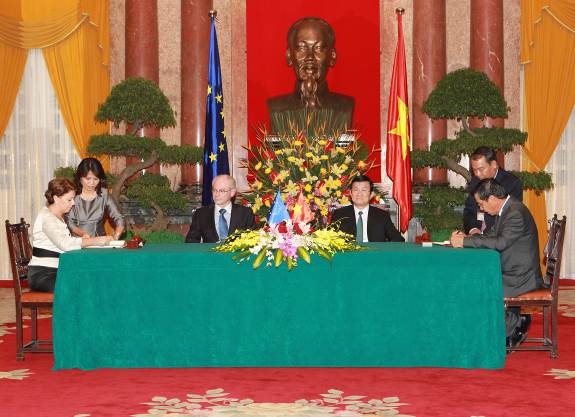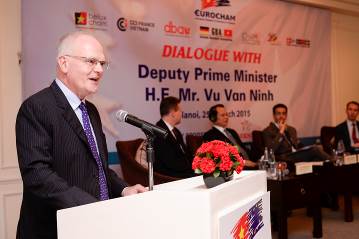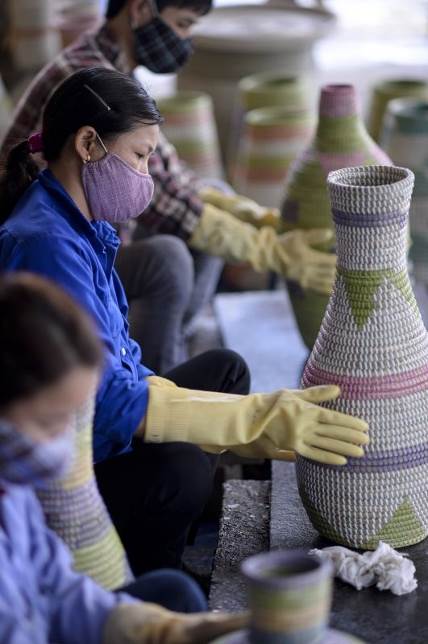EU-MUTRAP heralds new chapter in Vietnamese-European trade relations

The signing of the financing agreement of the EU-MUTRAP on October 31, 2012
Vietnamese Trade Minister Vu Huy Hoang is under no illusions that the next few years would represent a crucial time for Vietnam in terms of world trade. The minister, who is one of those currently overseeing the restructuring of the economy, believed that the next five years would see Vietnam cementing its place in the global economy.
According to Minister Hoang, the close co-operation with the European Union (EU) is important for the development of the Vietnamese economy and in, particular through the European Union Trade Policy and Investment Support Project (EU-MUTRAP). This project aims to strengthen Vietnam’s integration into the global and regional economies and to facilitate the country’s sustainable trade and investment relationships, not only with the EU but also the rest of the world.
This is the latest development in a role that the EU has played in supporting sustainable economic growth in Vietnam, beginning in the 1990s, which has seen the EU’s funding of projects in the area of trade policy and investment boost the country and take Vietnam-EU trade and investment relations to a new level.
According to Minister Hoang, “EU-MUTRAP marks a new, important cooperation stage between Vietnam and the EU, especially during the 2013-2018 period, a critical time for Vietnam, indeed, when the country is going to restructure its entire economy, renew its growth model, and meticulously integrate into the world economy.”
A highlight of the project, Minister Hoang continued, is the technical assistance extended to improve the local investment environment focusing on environmental and social issues in trade and investment-related policies and legislation.
Early involvement
The EU has already supported Vietnam through three phases of MUTRAP since the launch of MUTRAP I in 1998.
MUTRAP III, a project which was implemented from 2008-2012, reinforced Vietnam’s capacity to put WTO commitments into practice, conduct multilateral, regional, and bilateral trade negotiations, as well as ensure both fair competition in the domestic market and consumer protection. Its success was highlighted when the European Commission and OECD selected it as a model for the region and one of the most successful EU-funded technical assistance projects worldwide.
The result of these projects has been a huge number of executive acts in the form of circulars, decisions and decrees that were prepared and enacted by the Ministry of Industry and Trade (MoIT).
In January 2012, the European Commission also published the application for Protected Designation of Origin (PDO) “Phú Quốc” for the famous fish sauce produced on Phu Quoc Island, leading to recognition of its PDO status later that year. Phú Quốc fish sauce therefore joined Champagne, Parma Ham, Roquefort, and Stilton Cheese in enjoying this important protection on the EU market, becoming the first ASEAN product to do so.
Additionally, the University of Economics and Business, under the Vietnam National University, directly benefited from MUTRAP’s technical support and received the WTO Chair award.
The last phase of the project, MUTRAP III, ended in 2012 and was followed by a new trade related assistance project called the European Trade Policy and Investment Support Project (EU-MUTRAP).
Launched in August 2012, EU-MUTRAP will run until January 2018 and will assist Vietnam in its integration into the global, the ASEAN, and the sub-regional trading systems, as well as boost EU-Vietnam trade and investment ties in a bid to maximise local economic development and growth.
“The EU is a crucial trade partner for Vietnam, therefore, our overall objective will focus more on trade and investment relations between Vietnam and the EU,” said the project’s team leader Claudio Dordi. “However, the long-term impact of our work will have much wider implications.”
Like the three previous projects, the EUR€16.5 million EU-MUTRAP aims to achieve significant results. One example of EU-MUTRAP support is the “Vietnam Supporting Industries to EU”, implemented by the Supporting Industry Enterprises Development Centre (SIDEC) in conjunction with other development organisations. This project seeks to enhance capacity among local small and medium-sized enterprises (SMEs) in the “supporting industries” (components and parts manufacturers) to comply with European market access requirements.
Some of the activities include organising training courses to enhance SME capacities, organising activities to connect Vietnam-EU businesses and supporting them to participate in trade fairs and exhibitions in Vietnam and the EU.

“We are also committed to promoting further cooperation between the EU and Vietnam, and the EU is looking for many other activities and support to create favourable conditions for more investment in Vietnam, particularly from the EU, but not excluding other countries,” said Dr Franz Jessen, former Ambassador and Head of the EU Delegation to Vietnam.
“Since August 2012, EU-MUTRAP has conducted important preparatory work for Vietnam on international integration, and we wish to see successful cooperation between the two sides to help Vietnam improve the investment environment and economic restructuring.”
The crucial new phase
As well as showcasing Vietnam on the global economic stage, EU-MUTRAP will continue to support local SMEs, according to Minister Hoang. This is crucial; the vast majority of businesses in Vietnam are SMEs that operate in different fields from agricultural products to seafood and fisheries, and textile and apparel manufacturing.
EU-MUTRAP is therefore working on a number of issues to improve local SMEs’ potential, such as branding and marketing strategies, distribution and market access strategies, and information networks across the nation to create enhanced, export-focused trade sectors.
“What we have done in this programme from 2012 to 2018 is that we have focused our development cooperation on fewer countries, and within these countries, on fewer sectors than before. It is a way to keep our development cooperation more efficient, targeting the right countries and the right sectors,” said Jessen.
“I often compare Vietnam with Germany in terms of population and geographical size, making Vietnam a very big country, in this context. It is, in fact, a very young country and growing very fast, which means that in the future, I expect very close economic ties with Vietnam,” he continued.
According to Jessen, EU-MUTRAP will crucially accelerate the process of Vietnam’s integration into the world economy and support the country throughout the Vietnam-EU Free Trade Agreement (FTA) negotiations.
Likewise, according to Pierre Amilhat, Director at the Directorate-General at the European Commission Development and Cooperation, the FTA will definitely provide Vietnam with colossal opportunities to better access the European market. While the country has already been a giant exporter in the EU market, it can in fact do better, given the developments of the Free Trade Agreement (FTA).
The EU operators, on the other hand, also highly regard the local market and observe huge potential here. “I know that many European companies, industries, and traders are very interested in coming and doing business here in Vietnam,” Amilhat said. “Vietnam may finally become an Asian tiger as it was meant to some 20 years ago: I am pretty optimistic.”
“One of the EU’s values is the need to make the world a better place, make sure we assist the countries in need in a way that is in their best interests and is also in ours. We are fully involved in globalisation and we look at the world as a global village today,” added Amilhat.
 “Our philosophy is to help Vietnam help itself. We are spending the money in Vietnam but we are doing it in a way that the nation can take ownership and the people can use the money in a very constructive way,” said Jessen. “So a major part of our spending would go for budgetary support, which means that we are helping the Vietnamese government directly. We will make sure that they are working very closely with us and we ourselves also have certain criteria to fulfil, certain targets to achieve and we will keep an eye on what has been done and will be done by the local governments in line with our agreement.”
“Our philosophy is to help Vietnam help itself. We are spending the money in Vietnam but we are doing it in a way that the nation can take ownership and the people can use the money in a very constructive way,” said Jessen. “So a major part of our spending would go for budgetary support, which means that we are helping the Vietnamese government directly. We will make sure that they are working very closely with us and we ourselves also have certain criteria to fulfil, certain targets to achieve and we will keep an eye on what has been done and will be done by the local governments in line with our agreement.”
By the end of the project’s lifetime, both Vietnam and the EU can expect significant results, including the strengthening of EU-Vietnam trade and investment relations, the improvement of the investment policy framework, and greater access to information, regulations, and market opportunities in relation to Vietnam’s international trade and investment commitments being enhanced.
Additionally, the country’s institutional capability for negotiating and implementing multilateral, regional and sub-regional trade commitments will be reinforced and Vietnam’s dialogue with the EU in the area of economics will be closely supported within the framework agreement on the Comprehensive Partnership and Cooperation, to address any important and urgent trade issues that may arise in the future.
| EU-MUTRAP Project provides equipment to VN departments The European Trade Policy and Investment Support Project (EU-MUTRAP) yesterday provided information and technology (IT) equipment to departments and units under three ministries and the National Office of Intellectual Property. |
What the stars mean:
★ Poor ★ ★ Promising ★★★ Good ★★★★ Very good ★★★★★ Exceptional
Latest News
More News
- NAB Innovation Centre underscores Vietnam’s appeal for tech investment (January 30, 2026 | 11:16)
- Vietnam moves towards market-based fuel management with E10 rollout (January 30, 2026 | 11:10)
- Vietnam startup funding enters a period of capital reset (January 30, 2026 | 11:06)
- Vietnam strengthens public debt management with World Bank and IMF (January 30, 2026 | 11:00)
- PM inspects APEC 2027 project progress in An Giang province (January 29, 2026 | 09:00)
- Vietnam among the world’s top 15 trading nations (January 28, 2026 | 17:12)
- Vietnam accelerates preparations for arbitration centre linked to new financial hub (January 28, 2026 | 17:09)
- Vietnam's IPO market on recovery trajectory (January 28, 2026 | 17:04)
- Digital economy takes centre stage in Vietnam’s new growth model (January 28, 2026 | 11:43)
- EU Council president to visit Vietnam amid partnership upgrade (January 28, 2026 | 11:00)

















 Mobile Version
Mobile Version